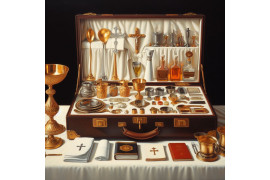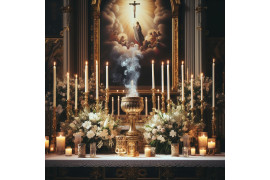Holy water holds a significant importance in the Catholic faith. Used in various rituals and sacraments, it serves as a symbol of spiritual cleansing and purification. Catholics believe that holy water possesses an inherent power to ward off evil spirits and protect against malevolent forces. This sacred substance is often sprinkled or used for blessings during religious ceremonies.
The potency of holy water stems from its consecration, which involves prayers and rituals performed by a priest. It is believed that through this process, the water becomes imbued with divine grace and blessings. As a result, when individuals come into contact with holy water, they are believed to receive spiritual benefits such as protection, healing, and renewal.
The question remains: why is holy water so powerful? Join us as we delve deeper into the origins, significance, and beliefs surrounding this sacred element in the Catholic tradition.
Understanding the Spiritual Power of Holy Water
The spiritual power of holy water is deeply rooted in its blessing by a priest. It is believed that this sacred act infuses the water with the grace of God, making it a powerful tool for blessings and protection. Let's explore why holy water holds such significance in religious practices.
Blessing by a Priest
One of the main reasons why holy water is considered powerful is because it undergoes a special blessing ceremony performed by a priest. During this ritual, prayers are said over the water, invoking the presence and blessings of the Holy Spirit. This act imbues the water with divine energy and transforms it into a sacred substance.
Containing God's Grace
Holy water is believed to contain the grace of God, which can bring blessings upon those who use it with faith. The grace of God refers to His unmerited favor and assistance bestowed upon individuals. When holy water is used in prayer or rituals, it is seen as a conduit for receiving this divine grace.
Symbolism of Baptism
Another reason behind the power of holy water lies in its connection to baptism. Baptism symbolizes rebirth and forgiveness of sins within Christian traditions. Water plays a central role in baptism ceremonies, cleansing individuals from their past transgressions and initiating them into their faith.
By using holy water, believers are reminded of their own baptismal vows and strive to live according to their religious teachings. It serves as a physical reminder of one's commitment to leading a virtuous life and seeking forgiveness for any wrongdoing.
Protection against Evil Spirits
Holy water is often used as an instrument for spiritual protection against evil spirits or negative energies. It is believed that when sprinkled or applied with faith, it can ward off malevolent forces and provide spiritual fortification.
In Catholic tradition, priests may use holy water during exorcisms or bless homes to cleanse them from any negative influences. Believers also use it to bless themselves or their loved ones as a form of spiritual protection and to seek divine intervention in times of difficulty.
Faith and Personal Belief
Ultimately, the power of holy water is deeply intertwined with an individual's faith and personal belief system. It is not the water itself that possesses inherent power, but rather the spiritual significance attributed to it by those who believe in its sacred nature.
When using holy water, it is important to approach it with reverence and sincere faith. The true power lies in one's connection to the divine and their openness to receiving blessings through this sacred medium.
Various Uses of Holy Water Every Catholic Should Know
Catholics use holy water for a multitude of purposes, each carrying its own significance and power. Let's explore the different ways in which holy water is used within the Catholic faith.
Personal Blessings: Making the Sign of the Cross and Sprinkling
One of the most common uses of holy water is for personal blessings. Catholics often make the sign of the cross with holy water before or after prayers as a way to invoke God's protection and grace. This simple act serves as a reminder of their baptismal vows and strengthens their connection to their faith.
Another way holy water is used for personal blessings is through sprinkling. Some individuals may choose to sprinkle themselves with holy water as they say a prayer, seeking purification and spiritual cleansing. This ritual can provide comfort and reassurance, helping believers feel closer to God.
Sacraments: Baptism, Confirmation, and Anointing of the Sick
Holy water plays a vital role in several sacraments within the Catholic Church. During baptism, an essential initiation into the faith, holy water is used to cleanse and purify those being baptized from original sin. It symbolizes new life in Christ and welcomes individuals into the community of believers.
Confirmation, another significant sacrament, involves anointing with chrism oil mixed with blessed holy water. The combination represents strength and empowerment by the Holy Spirit as individuals receive full membership into the Church.
In times of illness or when someone requires spiritual healing, the anointing of the sick takes place. Holy water may be used during this sacrament to offer solace and bring about physical or emotional relief.
Bringing Holy Water Home
It is not uncommon for Catholics to take home some blessed holy water from their church or pilgrimage sites. By doing so, they can continue incorporating it into their daily lives through personal prayers or blessing their living spaces.
Keeping a small font or container of holy water at home serves as a constant reminder of God's presence and protection. Many believers sprinkle holy water in their bedrooms, living rooms, or even around the perimeter of their homes as a way to invite divine blessings and safeguard against evil.
Blessing Pets, Work Spaces, and Objects with Holy Water
Catholics have long recognized the power of holy water in their spiritual practices. It is not just limited to personal use or in churches; holy water can also be utilized to bless other aspects of our lives. Let's explore how holy water can be used to bless pets, workspaces, and objects.
Blessing Pets
For many Catholics, pets are considered cherished members of the family. On special occasions like the Feast of St. Francis of Assisi, which celebrates the patron saint of animals, it is common for Catholics to bless their pets with holy water. This act symbolizes a desire for God's protection and intercession in their beloved pet's life.
Blessing pets with holy water is seen as a way to invoke God's blessings upon them and ask for His guidance in keeping them safe and healthy. It is believed that by sprinkling holy water on our furry friends, we are inviting divine grace into their lives.
Blessing Work Spaces
In today's fast-paced professional world, seeking God's guidance and protection in one's work endeavors has become increasingly important. Many Catholics choose to bless their workspaces with holy water as a way to invite the presence of God into their professional lives.
By anointing their desks or offices with holy water, individuals seek spiritual cleansing and purification within their work environment. This act serves as a reminder that they are not alone in their daily tasks, but have faith that God is present and guiding them every step of the way.
Blessing Objects
Holy water can also be used to bless various objects that hold religious significance for Catholics. Items such as rosaries, crucifixes, or religious medals can be blessed with holy water to enhance their spiritual significance.
When these objects are blessed with holy water, they are believed to become sacred vessels through which believers can connect more deeply with their faith. The water acts as a conduit for divine grace, imbuing these objects with a sense of holiness and spiritual power.
Protecting Against Evil: The Power of Holy Water
Sprinkling holy water around doorways or windows is believed to create a barrier against evil influences entering a home or building. This practice has been followed for centuries and is rooted in the belief that holy water possesses spiritual properties that can ward off evil spirits. It serves as a symbolic weapon in the battle against demonic forces.
Many Catholics keep small bottles filled with holy water near their bedsides for protection while sleeping. They believe that having holy water nearby acts as a safeguard against any malevolent entities that may try to disturb their sleep or infiltrate their dreams. It provides them with a sense of security and peace of mind, knowing that they are protected by the power of holy water.
Holy water also plays an important role during exorcisms, which are performed by trained priests to rid individuals or places of demonic possession. During these intense rituals, holy water is used as part of the Church's arsenal against evil forces. Its efficacy lies in its spiritual significance and the belief that it carries divine blessings capable of driving away demons.
The potency of holy water stems from its connection to religious traditions dating back to ancient times. In the Old Testament, there are references to the use of blessed water for purification and protection against evil. These practices have been passed down through generations, reinforcing the belief in the power of holy water.
While some skeptics may question its effectiveness, believers find solace and strength in the ritualistic use of holy water. It serves as a tangible reminder of their faith and offers them comfort during challenging times. The act of sprinkling or using holy water symbolizes an act of consecration, creating a sacred space where evil cannot prevail.
It is important to note that while holy water holds significant meaning within Catholicism, it should not be seen as a magical solution or substitute for personal responsibility and good judgment. Rather, it is considered a sacramental—a physical object that represents spiritual truths and aids in the practice of one's faith.
Holy Water in Church Prayers and Rituals: Symbolism and Reminders
Holy water fonts can be found at the entrance of Catholic churches, serving as a constant reminder to believers of their baptismal promises. These fonts are usually filled with blessed water, commonly known as holy water. But why is holy water so powerful? Let's explore its significance in church prayers and rituals.
Holy Water Fonts: A Reminder of Baptismal Promises
The presence of holy water fonts at the entrance of Catholic churches holds great symbolism. As believers dip their fingers into the font and make the sign of the cross, it serves as a reminder of their baptismal promises. According to Catholic teachings, baptism is viewed as a sacrament that cleanses individuals from original sin and initiates them into the Christian community.
Sprinkling Holy Water during Mass: Cleansing and Renewal
During Mass, you may have noticed priests sprinkling holy water over the congregation or specific areas within the church. This act symbolizes cleansing and renewal. The sprinkling of holy water is reminiscent of baptism, where water is used to cleanse and purify individuals spiritually.
The use of holy water during Mass also connects to another important aspect—the sacraments. In Catholicism, sacraments are sacred rituals that signify God's grace being bestowed upon believers. By incorporating holy water into these sacramental, such as baptisms or weddings, it serves as a tangible reminder of God's presence and grace throughout these ceremonies.
Holy Water in Sacramental: A Reminder of God's Presence
Sacramental are objects or actions that Catholics believe bring them closer to God's grace. Holy water plays a significant role in various sacramental within the Church. For example:
-
Blessings: Priests often bless people or objects by sprinkling them with holy water. This act invokes God's protection and blessings upon individuals or items.
-
Exorcisms: Holy water is used in exorcisms to drive away evil spirits. This practice demonstrates the belief in the spiritual power of holy water to protect against malevolent forces.
-
Home Blessings: During home blessings, priests may use holy water to bless each room. This act symbolizes inviting God's presence and protection into the household.
The Power of Tradition and Ritual
The use of holy water in church prayers and rituals is deeply rooted in tradition and serves as a powerful reminder of one's faith. It connects believers to their baptismal promises, cleanses and renews their spirits during Mass, and reminds them of God's presence through sacramentals.
Whether it be the Catholic Church, Orthodox Church, Episcopal Church, or other Christian denominations that incorporate the use of holy water, its significance remains consistent across these traditions. The power lies not only in the physical properties of the water but also in the symbolism attached to it and the faith it represents.
Reflecting on the Power of Holy Water
In conclusion, holy water holds a significant spiritual power in Catholicism. It is believed to be blessed by clergy members and carries the divine presence, making it a potent symbol of purification and protection. The various uses of holy water, from blessing objects and spaces to its role in church rituals, highlight its importance in the Catholic faith.
To fully appreciate the power of holy water, one should consider incorporating it into their own spiritual practices. Whether it is using it for personal blessings or seeking protection against evil, holy water can serve as a reminder of one's faith and provide comfort in times of need. By understanding the symbolism and significance behind this sacred element, individuals can deepen their connection to their spirituality.
FAQs
Can anyone use holy water?
Yes, anyone can use holy water. While it is most commonly used within the Catholic Church, individuals from various religious backgrounds may also find value in its symbolic cleansing properties.
How do I obtain holy water?
Holy water can typically be obtained from a Catholic church or chapel. Many churches have designated fonts where individuals can collect holy water for personal use.
Is there a specific way to use holy water?
There is no strict rule on how to use holy water. However, common practices include making the sign of the cross with it or sprinkling it over oneself or objects while reciting prayers.
Does holy water expire?
No, there is no expiration date for holy water. As long as it has been blessed by a clergy member, its spiritual significance remains intact.
Can I bless my own bottle of tap water to make it holy?
While individuals cannot bless their own tap water to make it "holy," they can certainly pray over or bless their drinking water as part of their personal spiritual practice.



